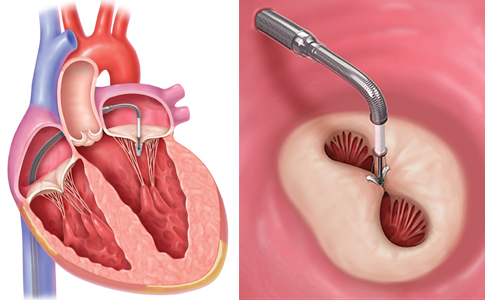Tiny Clip Helps Restore Blood Flow in Patients With Mitral Regurgitation
September 6, 2022Categories: Cover Story
 After the clip is gradually advanced below the valve leaflets (left), it is retracted and closed (right) to hold the leaflets together and allow blood to flow through each opening. Reproduced with permission of Abbott.
After the clip is gradually advanced below the valve leaflets (left), it is retracted and closed (right) to hold the leaflets together and allow blood to flow through each opening. Reproduced with permission of Abbott.
Interventional cardiologists at North Kansas City Hospital are the only physicians in the Northland performing a minimally invasive mitral valve repair to treat mitral regurgitation. The FDA-approved system, called the MitraClip™, stops regurgitation by closing the mitral leaflets.
The system is indicated for patients with moderate-to-severe or severe degenerative MR. “These are patients who previously could only be treated with open mitral valve repair or replacement,” said David Hahn, MD, FACC, an interventional cardiologist with Meritas Health Cardiology. “If they were not candidates for surgery, they generally did very poorly on medical management in the long term.”
In the 90-minute procedure, Dr. Hahn inserts a catheter over a guidewire into the femoral vein under fluoroscopic guidance to reach the left atrium, where he gradually advances the clip below the valve leaflets (see graphics). He then retracts and closes the clip, which holds the leaflets together and moves with the valve, allowing blood to flow through each opening.
During the procedure, a cardiologist with Meritas Health Cardiology — Srinivas Bapoje, MD, MPH, FACC, or Andrew Boerkircher, DO, FACC — provide comprehensive imaging with 3D transesophageal echocardiography of the mitral valve. After assessing the clip’s function and making any needed adjustments, Dr. Hahn removes the catheter.
Smaller than a dime, the clip is made of metal and covered with polyester fabric to promote healing. Patients typically stay overnight and return 30 days later for a follow-up echocardiogram.
Although some patients do not have symptoms of heart failure, over time it can worsen, leaving patients with shortness of breath, fatigue, excessive urination, fainting, swollen feet or ankles, an inability to exercise, a decrease in appetite and the risk of rehospitalization.
Dr. Hahn pointed to results of the COAPT trial, which showed a significant reduction in rehospitalizations at two years
in patients with heart failure and severe functional MR. Hospitalizations were 35.8% in the MitraClip group versus 67.9% in the medical therapy arm. Mortality in the MitraClip group was 45.7% versus 67.9% in the medical therapy arm.
The trial was conducted at 78 sites in the U.S. and Canada with an enrollment of 614 symptomatic patients with heart failure and moderate-to-severe or severe secondary MR. “Transcatheter Mitral-Valve Repair in Patients With Heart Failure” was published in the Dec. 13, 2018, issue of the New England Journal of Medicine.
“The No. 1 goal for patients with heart failure is to feel better. This solution will give patients a drastic improvement of their symptoms over their lifespans, such as being more able to complete household chores, take walks and go to the store,” Dr. Hahn added. “Now they can do these things with fewer symptoms. None of our medications are as good as the clip for the treatment of heart failure."

David Hahn, MD, FACC
Dr. Hahn earned his medical degree from the Roy J. and Lucille Carver College of Medicine. After his residency in internal medicine at Vanderbilt University Hospital, he was a fellow in cardiovascular disease at the University of Iowa Hospitals and Clinics.